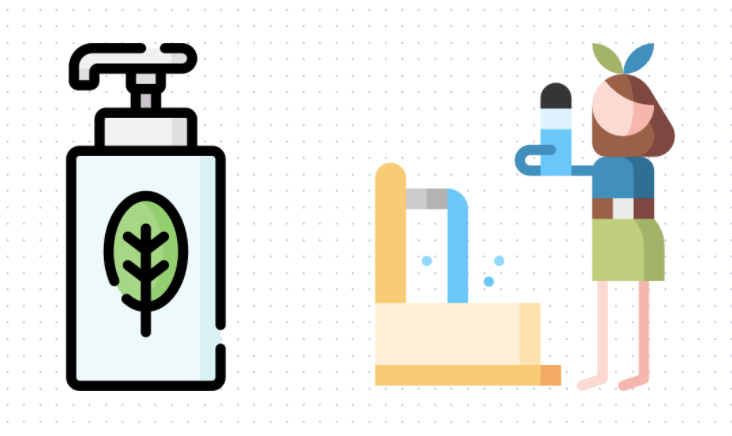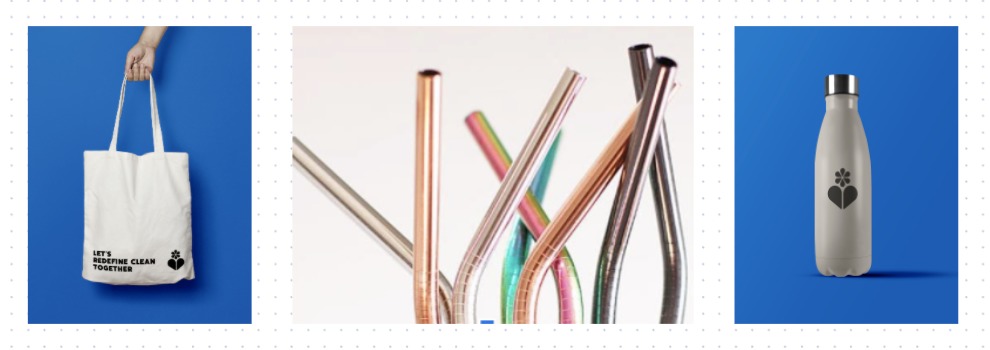As part of the “Deplastify the Planet” class, my team and I were assigned to work with Ecover, a Belgian company that manufactures ecologically sound cleaning products, to create an elevated experience for packaging free soaps.
As part of their business strategy, Ecover was looking to enter the North American soap market, targeting millennials and the Gen-Z customer segment. In addition, Ecover was looking to determine consumer interest in utilizing an in-store liquid dispenser to purchase sustainable household products like liquid soap and detergent. Thus, they had approached UC Berkeley students – an ideal age demographic to work with as they belong to their target customer segment; many of them are living on their own for the first time and are buying their own household products to clean, do laundry, and do dishes. Ecover understands that if they attract new customers while they are young, they can achieve lifetime brand loyalty.
This challenge was very open-ended and flexible, and we pivoted and changed many of our ideas over the course of the semester as we conducted more and more research. There were a few dimensions to this challenge: researching a refillable soap dispenser, exploring the ecommerce market, examining the benefits of a mobile app and analyzing social media strategies to better market the brand. These four key parts are related in that they all involve ways in which Ecover can market products to Gen Z consumers who are technologically savvy and enjoy online shopping and social media browsing. Moreover, these ideas took into consideration the impact of minimal packaging and ways in which environmentally friendly products can be advertised to younger consumers.
We were initially focused on evaluating the impact of a refillable liquid soap dispenser. The problem we were trying to tackle is plastic waste from excess soap packaging. We considered Ecover’s plans to distribute in store refillable soap dispensers in North America and conducted ethnographic research in order to determine consumer interest. We used our research to create customer profiles and concluded that Ecover’s ideal customer would likely be someone who is middle or upper class, politically active, socially conscious and located in a metropolitan or suburban area. We conducted around 700 Instagram surveys and found that the main pain points in attracting customers to use a refillable soap dispenser would be convenience of location and weight or carrying soap bottles or containers. We realized that Gen Z and millennials may be compelled to utilize a refillable soap dispenser if the experience was personalized, easy and incentivized. We suggested to Ecover the idea of a rewards system so customers could receive a discount every time they bring in their own bottle and use the refillable soap dispenser instead of buying an already packaged product on the shelf.
The main pain points in attracting customers to use a refillable soap dispenser would be convenience of location and weight or carrying soap bottles or containers.
Amrita Bhasin

Consumers would ideally bring in glass bottles and fill up liquid soap in store using the dispensers.
At this point, we transitioned from a hardware dispenser oriented-project to an ecommerce-based project. We did this because we realized that eco-friendly soap product boxes are revolutionary, and by focusing our project on ecommerce, we could challenge a traditional brand and push them to a different business and marketing model for Gen Z that would create lifelong brand loyalty. We considered the fact that young people enjoy buying products online, especially during COVID-19’s restrictions on in person shopping. We realized that offering an online option to purchase sustainable household supplies like soap is necessary in order for Ecover to reach younger consumers who prefer the convenience of regularly ordering products online. Given the problem of Ecover’s minimal online presence, we suggested that customers purchase refillable bottles online at a one time fee for the bottles. Ecover could then ship customizable soap tablets with minimal packaging that work with the containers. This solution is efficient because it cuts down on the amount of plastic waste involved in regularly buying plastic bottles of liquid soap. In addition to the soap tablets, we came up with another solution involving subscription boxes. Personalized, plastic free subscription boxes filled with eco-friendly soaps and detergents could be purchased online by customers. The idea of a biweekly or monthly subscription service would ensure that customers are engaged and regularly buying from Ecover. Moreover, we emphasized the importance of the subscription boxes being personalized and customized for each customer. For example, the boxes can have the customer’s name on them and personalized stickers explaining who put the order together so consumers can see the people behind Ecover’s brand. Sustainability metrics cards can show natural resource savings personalized for the customer’s order. This will allow the customer to see the tangible, environmental impact behind their purchase and loyalty to Ecover products.
Ecover can offer rewards to customers who mail back used packaging to Ecover facilities for recycling. Ecover can also reward customer loyalty by offering discounts after a certain number of orders as well as free, inexpensive gifts in the box that encourage environmental sustainability. Examples of gifts include metal straws, Ecover branded totes and Ecover branded water bottles.

Moreover, instituting a referral program and giving free Ecover credit would attract new customers and grow Ecover’s online presence and ecommerce model.
We supplemented Ecover’s ecommerce subscription model with the idea of a mobile app given the problem of Ecover not having a centralized way for customers to purchase personalized products online. Using Figma, we designed and wireframed a mobile app that would enable online ordering. The mobile app screens walk through the customer journey from signing up, picking and customizing scents, choosing a subscription option and paying.
Social media is becoming a great source of ecommerce and online marketing for many brands. Ecover’s problem is that they do not have a strong social media presence or following among Gen Z and are not utilizing the many functions social media platforms like Instagram offer to companies and brands. As a result, we came up with a list of recommendations for Ecover to reinvent their social media presence. For example, we suggested taking advantage of Instagram Shopping, so Instagram users could buy products with the click of a button while browsing on social media. We also recommended launching a social media campaign on Instagram and partnering with sustainable influencers as well as other environmentally friendly brands such as Method in order to expand social media awareness and online interactions. In addition, Ecover should stick to a green color theme and aesthetic with regards to posting photos, so social media users better associate Ecover with environmental sustainability. Ecover should also utilize the Instagram Stories function more often as a way of promoting products and should conduct product giveaways for users who tag friends in the comments. This will enable Ecover to expand their social media reach and bring more users onto their page who will then be able to browse and buy products as well as learn more about Ecover’s mission.
In conclusion, our role in the challenge as Gen Z involved targeting young consumers who serve as a new customer base for Ecover. We considered Ecover’s existing customer segment and constraints of price and accessibility that we determined through our research. Through a new ecommerce model and the concept of subscription boxes as well as free products, incentives, referrals and discounts, we mitigated and worked around this to make household cleaning products seem exciting and compelling! This project allowed us to better understand the importance of political and environmental branding in marketing, particularly when attempting to attract Gen Z customers. Our research and ideas show the importance of sustainability and environmentalism among household cleaning products and brands such as Loop, Grove and Blueland that built up a credibility toward the product box subscription model. Existing models suggest that there are many strategies companies can take to show consumers that they value environmentally friendly products and are actively working to create plastic free packaging. Ultimately, Ecover differentiates itself by targeting Gen Z and millennials and offering customization and personalization as a part of its product boxes, features that attract a younger and more technologically savvy market.

